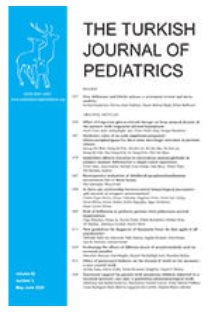Unusual and early onset IPEX syndrome: a case report
___
1. Wirth M, Jellimann JM, Jellimann S, Hascoet JM. Neonatal diabetes mellitus: Improved screening and early management of an underestimated disease. Clin Case Rep 2018; 6: 18-22.2. Støy J, Edghill EL, Flanagan SE, et al; Neonatal Diabetes International Collaborative Group. Insulin gene mutations as a cause of permanent neonatal diabetes. Proc Natl Acad Sci U S A 2007; 104: 15040- 15044.
3. Greeley SA, Naylor RN, Philipson LH, Bell GI. Neonatal diabetes: An expanding list of genes allows for improved diagnosis and treatment. Curr Diab Rep 2011; 11: 519-532.
4. d'Hennezel E, Bin Dhuban K, Torgerson T, Piccirillo CA. The immunogenetics of immune dysregulation, polyendocrinopathy, enteropathy, X linked (IPEX) syndrome. J Med Genet 2012; 49: 291-302.
5. Wildin RS, Smyk-Pearson S, Filipovich AH. Clinical and molecular features of the immunodysregulation, polyendocrinopathy, enteropathy, X linked (IPEX) syndrome. J Med Genet 2002; 39: 537-545.
6. Rubio-Cabezas O, Minton JAL, Caswell R, et al. Clinical heterogeneity in patients with FOXP3 mutations presenting with permanent neonatal diabetes. Diabetes Care 2009; 32: 111-116.
7. Kaya Z. Tam kan sayım çıktılarının yorumlanması. Dicle Tıp Dergisi 2013; 40: 521-528.
8. İkincioğulları A, Kendirli T, Doğu F, et al. Peripheral13. Ge T, Wang Y, Che Y, Xiao Y, Zhang T. Atypical lateonset immune dysregulation, polyendocrinopathy, enteropathy, X-Linked syndrome with intractable diarrhea: A case report. Front Pediatr 2017; 5: 267. 14. Hwang JL, Park SY, Ye H, et al; T2D-Genes Consortium. FOXP3 mutations causing early-onset insulin-requiring diabetes but without other features of immune dysregulation, polyendocrinopathy, enteropathy, X-linked syndrome. Pediatr Diabetes 2018; 19: 388-392. 15. Park E, Chang HJ, Shin JI, et al. Familial IPEX syndrome: Different glomerulopathy in two siblings. Pediatr Int 2015; 57: e59-e61. 16. Bacchetta R, Barzaghi F, Roncarolo MG. From IPEX syndrome to FOXP3 mutation: A lesson on immune dysregulation. Ann N Y Acad Sci 2018; 1417: 5-22. 17. Gambineri E, Perroni L, Passerini L, et al. Clinical and molecular profile of a new series of patients with immune dysregulation, polyendocrinopathy, enteropathy, X-linked syndrome: Inconsistent correlation between forkhead box protein 3 expression and disease severity. J Allergy Clin Immunol 2008; 122: 1105-1112.e1. 18. Barzaghi F, Amaya Hernandez LC, Neven B, et al; Primary Immune Deficiency Treatment Consortium (PIDTC) and the Inborn Errors Working Party (IEWP) of the European Society for Blood and Marrow Transplantation (EBMT). Long-term follow-up of IPEX syndrome patients after different therapeutic strategies: An international multicenter retrospective study. J Allergy Clin Immunol 2018; 141: 1036-1049. e5. blood lymphocyte subsets in healthy Turkish children. Turk J Pediatr 2004; 46: 125-130.
9. Ladomenou F, Gaspar B. How to use immunoglobulin levels in investigating immune deficiencies. Arch Dis Child Educ Pract Ed 2016; 101: 129-135.
10. Smith E, Greeley SA, Ye H, et al. Extremely early onset IPEX syndrome caused by a novel small exonic deletion in FOXP3. J Pediatr Gastroenterol Nutr 2016; 63: e119-e120.
11. Powell BR, Buist NR, Stenzel P. An X-linked syndrome of diarrhea, polyendocrinopathy, and fatal infection in infancy. J Pediatr 1982; 100: 731-737.
12. Bennett CL, Brunkow ME, Ramsdell F, et al. A rare polyadenylation signal mutation of the FOXP3 gene (AAUAAA→AAUGAA) leads to the IPEX syndrome. Immunogenetics 2001; 53: 435-439.
13. Ge T, Wang Y, Che Y, Xiao Y, Zhang T. Atypical lateonset immune dysregulation, polyendocrinopathy, enteropathy, X-Linked syndrome with intractable diarrhea: A case report. Front Pediatr 2017; 5: 267.
14. Hwang JL, Park SY, Ye H, et al; T2D-Genes Consortium. FOXP3 mutations causing early-onset insulin-requiring diabetes but without other features of immune dysregulation, polyendocrinopathy, enteropathy, X-linked syndrome. Pediatr Diabetes 2018; 19: 388-392.
15. Park E, Chang HJ, Shin JI, et al. Familial IPEX syndrome: Different glomerulopathy in two siblings. Pediatr Int 2015; 57: e59-e61.
16. Bacchetta R, Barzaghi F, Roncarolo MG. From IPEX syndrome to FOXP3 mutation: A lesson on immune dysregulation. Ann N Y Acad Sci 2018; 1417: 5-22.
17. Gambineri E, Perroni L, Passerini L, et al. Clinical and molecular profile of a new series of patients with immune dysregulation, polyendocrinopathy, enteropathy, X-linked syndrome: Inconsistent correlation between forkhead box protein 3 expression and disease severity. J Allergy Clin Immunol 2008; 122: 1105-1112.e1.
18. Barzaghi F, Amaya Hernandez LC, Neven B, et al; Primary Immune Deficiency Treatment Consortium (PIDTC) and the Inborn Errors Working Party (IEWP) of the European Society for Blood and Marrow Transplantation (EBMT). Long-term follow-up of IPEX syndrome patients after different therapeutic strategies: An international multicenter retrospective study. J Allergy Clin Immunol 2018; 141: 1036-1049. e5.
- ISSN: 0041-4301
- Yayın Aralığı: Yılda 6 Sayı
- Başlangıç: 1958
- Yayıncı: Hacettepe Üniversitesi Çocuk Sağlığı Enstitüsü Müdürlüğü
Unusual and early onset IPEX syndrome: a case report
Dilek DOĞRUEL, Fatih GÜRBÜZ, İhsan TURAN, Derya Ufuk ALTINTAŞ, Mustafa YILMAZ, Bilgin YÜKSEL
Özen AŞUT, Gulifeiya ABUDUXİKE, Songül Acar VAİZOĞLU, Şanda ÇALI
An adolescent case of extensive Behçet’s disease successfully treated with Infliximab
Emel ISIYEL, Sevcan BAKKALOĞLU, Deniz OĞUZ, İdil YENİCESU, Öznur BOYUNAĞA, Yeşim ÖZDEMİR, Çağrı DAMAR, Yaşar KANDUR, Meltem AKÇABOY, Ayşe Tana ASLAN, Tuğba ŞİŞMANLAR, Enver HASANOĞLU, Necla BUYAN
The potential utility of real-time PCR of the 16S-rRNA gene in the diagnosis of neonatal sepsis
Kenan İSTANBULLU, Nilgün KÖKSAL, Merih ÇETİNKAYA, Hilal ÖZKAN, Tahsin YAKUT, Mutlu KARKUCAK, Haldun DOĞAN
Optic neuropathies in childhood: a review of etiology and treatment
Ceren GÜNBEY, Bahadır KONUŞKAN
Eleven-year surveillance of acute flaccid paralysis in southwestern Iran
Ali Akbar MOMEN, Abdolhussein SHAKURNİA, Mehdi MOMEN
Stevens-Johnson syndrome and toxic epidermal necrolysis: a report of six cases
Ahu KARA, İlker DEVRİM, İlknur ÇAĞLAR, Nuri BAYRAM, Selcen KUNDAK, Hurşit APA, Emir Volkan ALTAN
Complete atrioventricular block associated with clozapine intoxication: case report
Mehmet TÜRE, Meki BİLİCİ, Alper AKIN, Fikri DEMİR, Hasan BALIK, Savaş Mert DARAKÇI
Kemal ÖZYURT, Mustafa ATASOY, Ragıp ERTAŞ, Yılmaz ULAŞ, Muhammed Reşat AKKUŞ, Aslıhan KİRAZ, Hans Christian HENNİES
